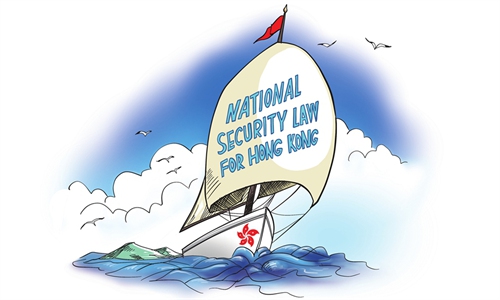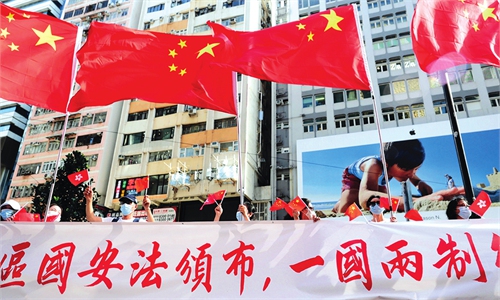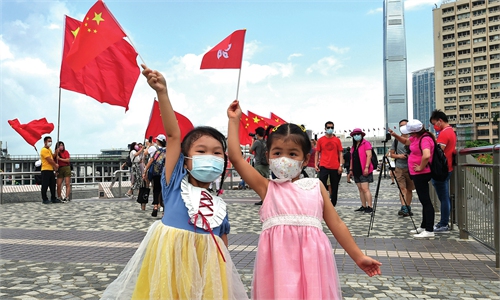Exclusive: Newly appointed Hong Kong second-in-command on ensuring only patriots will prevail through election reform
Editor's Note:
John Lee Ka-chiu (Lee) was appointed as chief secretary for administration on June 25, which is the No.2 position after the chief executive of the HKSAR government. On July 6, Lee was also appointed as the chairman of the Candidate Eligibility Review Committee for local elections. When Global Times reporters Chen Qingqing and Bai Yunyi (GT) interviewed this Hong Kong official on Tuesday, he talked about his responsibilities after assuming these two positions, and his experiences of implementing various policies under the national security law for Hong Kong and electoral reform. He also talked about his future work plans in ensuring the three upcoming, important elections will take place smoothly, especially how to ensure all the candidates are genuine patriots.
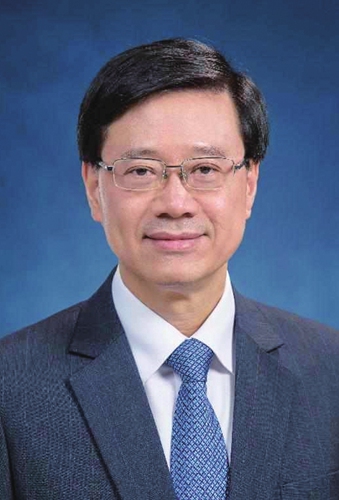
GT: As you were appointed as chief secretary for the Hong Kong Special Administrative Region government on June 25 and as the chairman of the candidate qualification review committee for local elections on July 6, what do these two appointments mean to you? What will your most immediate mandate be?
Lee: These mean a lot to me, as I will take great responsibility. The implementation of the national security law for Hong Kong and the electoral reform are a compound of measures in order to implement the principle of "only patriots governing Hong Kong." I'll carry on with this work in order to make the measure take effect.
The priority for my future work will include making sure no one can disguise themselves as patriots to take part in the upcoming elections, who pretend to "uphold the Basic Law" and "pledge loyalty to the HKSAR government," in the work of the candidate qualification review committee.
Also, with the national security law for Hong Kong helping stabilize the society, I'll work on clearing obstacles in local governance in order to focus on effectively implementing policies. To make sure the three future elections take place safely, are orderly, legitimately, and effectively is also important. The elections will be held soon, and the interval between them is basically only three months so there will be a lot of work to get done.
Another important work is to implement the national security law for Hong Kong in different sectors.
GT: Specifically, how can you make sure those who disguise themselves as patriots can't take part in the elections? What are the criteria you will take into account when reviewing candidacies?
Lee: There's a clear list in the Hong Kong local law which stipulates what behaviors are against upholding the Basic Law and pledging loyalty to the HKSAR government. There are some clear criteria:
First, a person can't commit acts or carry out activities that endanger national security or violate the national security law.
Second, the person can't refuse to recognize the constitutional status of the HKSAR as a local administrative region of China, like advocating or supporting "Hong Kong independence," or promoting "self-determination of sovereignty or jurisdiction." The person is not allowed to solicit foreign assistance deemed as interference by foreign governments or organizations in the affairs of the HKSAR.
Third, behaviors like undermining or having a tendency to undermine the order of the political structure led by the chief executive, compelling or pressuring the chief executive by unlawful means in order to change a policy, or organizing a "de facto referendum" in any form, are not allowed.
Forth, desecration of the national flag or national emblem, or regional flag or regional emblem is not allowed, as clearly stipulated in the forbidden list.
I want to emphasize that to evaluate whether a person truly upholds the Basic Law and bears allegiance to the local government, besides those forbidden behaviors, other factors must also be taken into comprehensive account. That means, the committee won't be limited within the scope of local ordinance but will consider other conducts of candidates outside the list, and fully deliberate before making the final decision, to make sure no one pretends to "uphold the Basic Law" or "bear allegiance."
GT: Could you be more specific on what the factors outside the list are? Could you give us some examples?
Lee: If we list all the circumstances, those who intend to disguise themselves as patriots may find loopholes through which they can circumvent the review process. So it would be counterintuitive to reveal such specifics at this time. There are similar moves in foreign countries on this aspect. We must make sure no one is able to subvert the purpose of the review process.
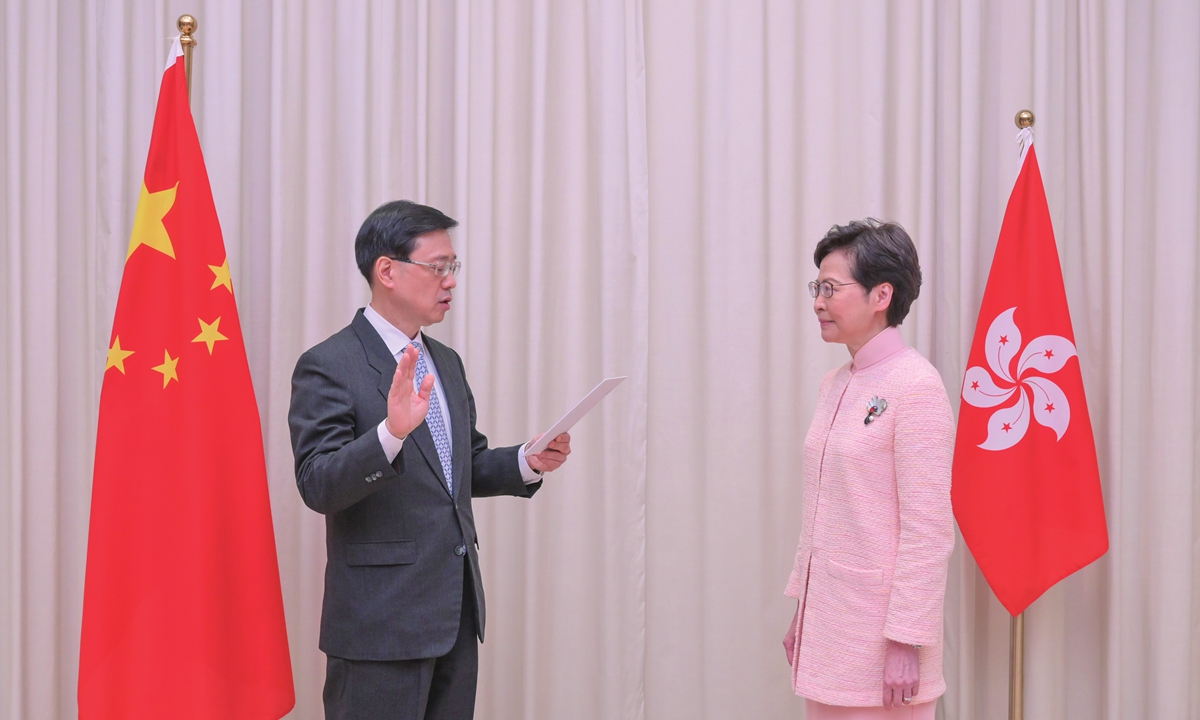
GT: Hong Kong is about to hold three important elections. What work will the HKSAR government undertake to make sure the elections take place smoothly?
Lee: We'll do full-scale risk-evaluation including on security and against possible sabotage, especially risks directly endangering national security, as external forces are still waiting for chances to sabotage the processes in Hong Kong.
We'll do a large amount of evaluation work and be fully prepared for deployment, for example by dispatching law enforcement officials during those days to patrol in a high-profile manner, to tighten security at every place, and engage in some preventive work.
The Independent Commission Against Corruption of Hong Kong will also take part in supervising every ballot, to make sure no corruptive activities will have occurred during the whole process. On the internet, we'll closely follow up and monitor information in case someone publishes information involving sabotage or instigation; we'll take the action immediately.
To sum up, we'll handle situations as they arise and will bring the situation under control.
GT: There was a "lone-wolf" terrorist attack in Hong Kong, and the Hong Kong Police Force (HKPF) has also found organizations making explosives and plotting terrorist attacks. Do you think such "lone-wolf" attacks might become a trend? Will you coordinate resources inside the local government to handle such safety threats?
Lee: The recent incidents showed that we surely have to confront rising incidences of local terrorism in Hong Kong. This month, the HKPF arrested 14 people from an organization with nine being students, who planned to deploy bombs and explosives in places such as the tunnel, courthouse, and government buildings, and so on, to cause serious damage. Among some others arrested, a 3D-printer was recovered which had already been used to fashion weapons like guns. Also, there were people who threw bombs at the government building.
All these incidents showed that Hong Kong indeed faces risks of local terrorism, and everyone needs to remain cautious. However, I think Hong Kong authorities, especially the HKPF, are capable of handling those cases. As we can see, they did a good intelligence job, as the potential attacks were contained before they were successfully carried out.
When I worked as security bureau chief, I coordinated a cross-departmental discipline specializing in anti-terrorism which involved six departments including the HKPF, Hong Kong Correctional Services, and the Immigration Department in order to enhance intelligence collection. During the black-clad riots in 2019, the HKPF unearthed over 20 terrorist plots. So I'm very confident in the law enforcement departments in Hong Kong, and the overall risks from possible local terrorism plots are under control.
Now the "lone-wolf" attacks create new challenges. In cases of criminal gangs and terrorist cells, communications within the group can be intercepted by the authorities. But there are rarely any warning signs when it comes to instances of "lone wolf" attacks, which occur suddenly, making them much harder to prevent.
Under this situation, Hong Kong must crack down on all the symptoms of terrorism by containing them from further spreading, which is very important. Also, we have to make the public understand the fight against terrorism is a common responsibility shared by the society, as terrorism can permeate different aspects of the society, which needs the overall cooperation and prevention of all the local residents.
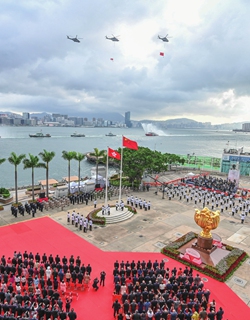
GT: Chief Executive Carrie Lam told the media previously that with the national security law for Hong Kong and electoral reform, Hong Kong has a lot to do in improving the system, for example, in education, media, and civil service sectors. What sector do you think needs reform the most? What are the specific tasks?
Lee: I think there are two parts that need work. One is in the education sector and the other is management.
The national security education is a long-term project. The HKSAR government will continue enhancing the promotion of the relevant work, for example, by launching the national security law for all, and education is equally important. For now, the education bureau has been pushing forward with the national security-curriculum in schools, and started the training work for teachers and principals.
The work in the non-traditional education sector is also important, for example, by forbidding the content of "Hong Kong independence" notions embedded in books, newspapers, and magazines, to lead the overall ideology of Hong Kong society onto the right path.
On the management side, Hong Kong society should strengthen its collective awareness. When handling administrative work, the HKSAR government should review its own work to see which area it needs to enhance in assuming the responsibility of safeguarding national security. Every industry and every entity also needs to self-review to achieve this goal in conjunction with the government.
Overall, over the past year since the national security law for Hong Kong took effect, the situation in Hong Kong has changed a lot. Not only in terms of enhanced safety for residents, but the national security awareness has been primarily established. Every department is now working on their own long-term work plans. We are fully confident and optimist about the future.
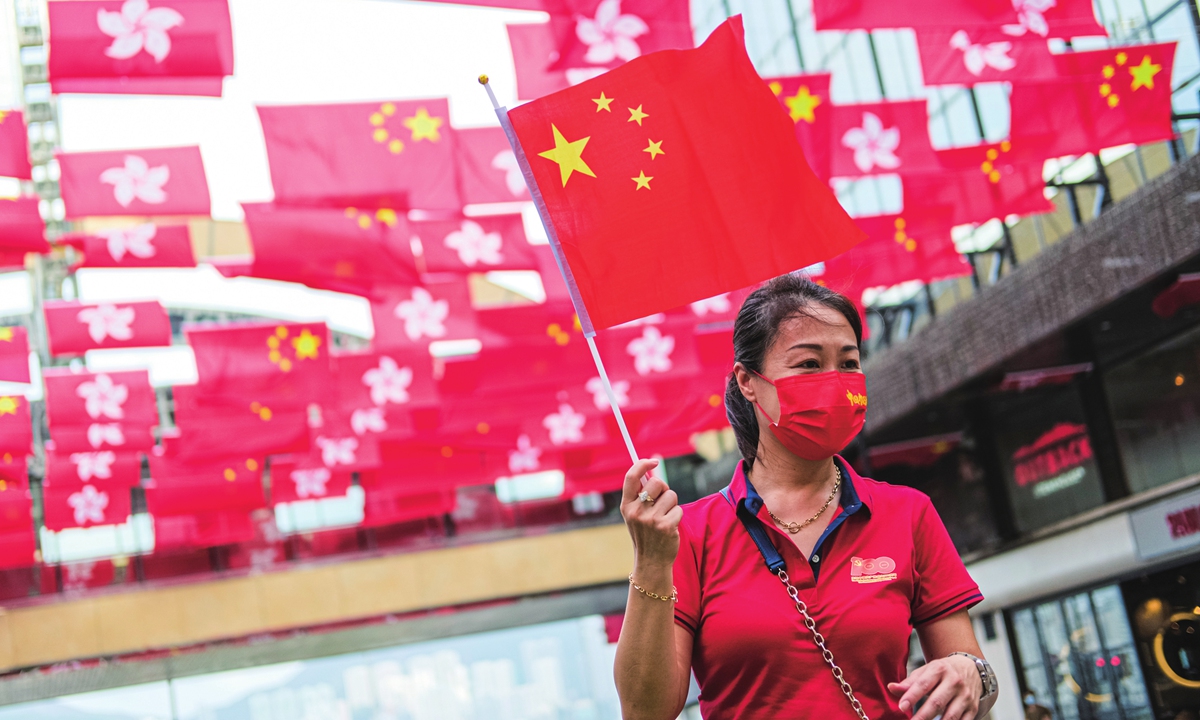
GT: During the rest of the year under the current government, do you think the implementation of Article 23 might be pushed forward? Can we expect to see the implementation of Article 23 in the next year?
Lee: We expect much more eagerness in the implementation of Article 23 of the Basic Law. In fact, the research work on the article has not stopped since the black-clad riots in 2019.
From 2019 to 2020, Hong Kong has experienced unprecedented national security risks, which made us see for the first time that the national security risks could come up in such sudden ways and cause such severe damages. So as long as we push forward with the implementation of Article 23, we must make sure it will work, by dealing with the most extreme circumstances and preventing the lawbreakers from using existing loopholes.
GT: While the candidate qualification review committee needs to make sure only patriots can enter the elections and subsequently govern, are those already in the governance structure all patriots? From some civil servants' performance during the social turmoil in 2019, how do you evaluate Hong Kong civil servants' performance in upholding the Basic Law and bearing allegiance to the HKSAR government?
Lee: For now, all the civil servants in Hong Kong have accomplished the oath-taking process for upholding the Basic Law, and in response to those who did not take the oath, we've followed up with relevant moves by asking them to leave their positions or taking disciplinary measures.
From the working capability and efficiency, Hong Kong's civil servants are outstanding. A recent world competitiveness report showed that the efficiency of the HKSAR government is ranked as the top one in the world, which means the civil servants here are professional.
Also, for the civil servant training, there's no best but only better. On how to make Hong Kong civil servants better understand the nation, the Constitution, the Basic Law and the national security law for Hong Kong, we have a lot of training work to do including how to play out the edges of the "one country, two systems," helping Hong Kong integrate into the country's overall development plan, and unleash its potential in making more contributions to the country. This is a long-term process.
I'm fully confident in Hong Kong civil servants, as their recognition of the country has been underscored in their oath-taking. And we'll do more work in their understanding and contribution to the country.
John Lee Ka-chiu (Lee) was appointed as chief secretary for administration on June 25, which is the No.2 position after the chief executive of the HKSAR government. On July 6, Lee was also appointed as the chairman of the Candidate Eligibility Review Committee for local elections. When Global Times reporters Chen Qingqing and Bai Yunyi (GT) interviewed this Hong Kong official on Tuesday, he talked about his responsibilities after assuming these two positions, and his experiences of implementing various policies under the national security law for Hong Kong and electoral reform. He also talked about his future work plans in ensuring the three upcoming, important elections will take place smoothly, especially how to ensure all the candidates are genuine patriots.

John Lee Ka-chiu
GT: As you were appointed as chief secretary for the Hong Kong Special Administrative Region government on June 25 and as the chairman of the candidate qualification review committee for local elections on July 6, what do these two appointments mean to you? What will your most immediate mandate be?
Lee: These mean a lot to me, as I will take great responsibility. The implementation of the national security law for Hong Kong and the electoral reform are a compound of measures in order to implement the principle of "only patriots governing Hong Kong." I'll carry on with this work in order to make the measure take effect.
The priority for my future work will include making sure no one can disguise themselves as patriots to take part in the upcoming elections, who pretend to "uphold the Basic Law" and "pledge loyalty to the HKSAR government," in the work of the candidate qualification review committee.
Also, with the national security law for Hong Kong helping stabilize the society, I'll work on clearing obstacles in local governance in order to focus on effectively implementing policies. To make sure the three future elections take place safely, are orderly, legitimately, and effectively is also important. The elections will be held soon, and the interval between them is basically only three months so there will be a lot of work to get done.
Another important work is to implement the national security law for Hong Kong in different sectors.
GT: Specifically, how can you make sure those who disguise themselves as patriots can't take part in the elections? What are the criteria you will take into account when reviewing candidacies?
Lee: There's a clear list in the Hong Kong local law which stipulates what behaviors are against upholding the Basic Law and pledging loyalty to the HKSAR government. There are some clear criteria:
First, a person can't commit acts or carry out activities that endanger national security or violate the national security law.
Second, the person can't refuse to recognize the constitutional status of the HKSAR as a local administrative region of China, like advocating or supporting "Hong Kong independence," or promoting "self-determination of sovereignty or jurisdiction." The person is not allowed to solicit foreign assistance deemed as interference by foreign governments or organizations in the affairs of the HKSAR.
Third, behaviors like undermining or having a tendency to undermine the order of the political structure led by the chief executive, compelling or pressuring the chief executive by unlawful means in order to change a policy, or organizing a "de facto referendum" in any form, are not allowed.
Forth, desecration of the national flag or national emblem, or regional flag or regional emblem is not allowed, as clearly stipulated in the forbidden list.
I want to emphasize that to evaluate whether a person truly upholds the Basic Law and bears allegiance to the local government, besides those forbidden behaviors, other factors must also be taken into comprehensive account. That means, the committee won't be limited within the scope of local ordinance but will consider other conducts of candidates outside the list, and fully deliberate before making the final decision, to make sure no one pretends to "uphold the Basic Law" or "bear allegiance."
GT: Could you be more specific on what the factors outside the list are? Could you give us some examples?
Lee: If we list all the circumstances, those who intend to disguise themselves as patriots may find loopholes through which they can circumvent the review process. So it would be counterintuitive to reveal such specifics at this time. There are similar moves in foreign countries on this aspect. We must make sure no one is able to subvert the purpose of the review process.

John Lee Ka-chiu (left) takes the oath of office to become the Chief Secretary for Administration before Chief Executive Carrie Lam in Hong Kong on June 25. Photo: cnsphoto
GT: Hong Kong is about to hold three important elections. What work will the HKSAR government undertake to make sure the elections take place smoothly?
Lee: We'll do full-scale risk-evaluation including on security and against possible sabotage, especially risks directly endangering national security, as external forces are still waiting for chances to sabotage the processes in Hong Kong.
We'll do a large amount of evaluation work and be fully prepared for deployment, for example by dispatching law enforcement officials during those days to patrol in a high-profile manner, to tighten security at every place, and engage in some preventive work.
The Independent Commission Against Corruption of Hong Kong will also take part in supervising every ballot, to make sure no corruptive activities will have occurred during the whole process. On the internet, we'll closely follow up and monitor information in case someone publishes information involving sabotage or instigation; we'll take the action immediately.
To sum up, we'll handle situations as they arise and will bring the situation under control.
GT: There was a "lone-wolf" terrorist attack in Hong Kong, and the Hong Kong Police Force (HKPF) has also found organizations making explosives and plotting terrorist attacks. Do you think such "lone-wolf" attacks might become a trend? Will you coordinate resources inside the local government to handle such safety threats?
Lee: The recent incidents showed that we surely have to confront rising incidences of local terrorism in Hong Kong. This month, the HKPF arrested 14 people from an organization with nine being students, who planned to deploy bombs and explosives in places such as the tunnel, courthouse, and government buildings, and so on, to cause serious damage. Among some others arrested, a 3D-printer was recovered which had already been used to fashion weapons like guns. Also, there were people who threw bombs at the government building.
All these incidents showed that Hong Kong indeed faces risks of local terrorism, and everyone needs to remain cautious. However, I think Hong Kong authorities, especially the HKPF, are capable of handling those cases. As we can see, they did a good intelligence job, as the potential attacks were contained before they were successfully carried out.
When I worked as security bureau chief, I coordinated a cross-departmental discipline specializing in anti-terrorism which involved six departments including the HKPF, Hong Kong Correctional Services, and the Immigration Department in order to enhance intelligence collection. During the black-clad riots in 2019, the HKPF unearthed over 20 terrorist plots. So I'm very confident in the law enforcement departments in Hong Kong, and the overall risks from possible local terrorism plots are under control.
Now the "lone-wolf" attacks create new challenges. In cases of criminal gangs and terrorist cells, communications within the group can be intercepted by the authorities. But there are rarely any warning signs when it comes to instances of "lone wolf" attacks, which occur suddenly, making them much harder to prevent.
Under this situation, Hong Kong must crack down on all the symptoms of terrorism by containing them from further spreading, which is very important. Also, we have to make the public understand the fight against terrorism is a common responsibility shared by the society, as terrorism can permeate different aspects of the society, which needs the overall cooperation and prevention of all the local residents.

Lee leads other senior officials in attending the flag-raising ceremony on July 1 at the Golden Bauhinia Square of Hong Kong. Photo: IC
GT: Chief Executive Carrie Lam told the media previously that with the national security law for Hong Kong and electoral reform, Hong Kong has a lot to do in improving the system, for example, in education, media, and civil service sectors. What sector do you think needs reform the most? What are the specific tasks?
Lee: I think there are two parts that need work. One is in the education sector and the other is management.
The national security education is a long-term project. The HKSAR government will continue enhancing the promotion of the relevant work, for example, by launching the national security law for all, and education is equally important. For now, the education bureau has been pushing forward with the national security-curriculum in schools, and started the training work for teachers and principals.
The work in the non-traditional education sector is also important, for example, by forbidding the content of "Hong Kong independence" notions embedded in books, newspapers, and magazines, to lead the overall ideology of Hong Kong society onto the right path.
On the management side, Hong Kong society should strengthen its collective awareness. When handling administrative work, the HKSAR government should review its own work to see which area it needs to enhance in assuming the responsibility of safeguarding national security. Every industry and every entity also needs to self-review to achieve this goal in conjunction with the government.
Overall, over the past year since the national security law for Hong Kong took effect, the situation in Hong Kong has changed a lot. Not only in terms of enhanced safety for residents, but the national security awareness has been primarily established. Every department is now working on their own long-term work plans. We are fully confident and optimist about the future.

A woman holds a Chinese national flag and stands under the flags of China and Hong Kong SAR on July 1 to celebrate the 100th anniversary of the founding of the Chinese Communist Party and the 24th anniversary of Hong Kong return to China. Photo: IC
GT: During the rest of the year under the current government, do you think the implementation of Article 23 might be pushed forward? Can we expect to see the implementation of Article 23 in the next year?
Lee: We expect much more eagerness in the implementation of Article 23 of the Basic Law. In fact, the research work on the article has not stopped since the black-clad riots in 2019.
From 2019 to 2020, Hong Kong has experienced unprecedented national security risks, which made us see for the first time that the national security risks could come up in such sudden ways and cause such severe damages. So as long as we push forward with the implementation of Article 23, we must make sure it will work, by dealing with the most extreme circumstances and preventing the lawbreakers from using existing loopholes.
GT: While the candidate qualification review committee needs to make sure only patriots can enter the elections and subsequently govern, are those already in the governance structure all patriots? From some civil servants' performance during the social turmoil in 2019, how do you evaluate Hong Kong civil servants' performance in upholding the Basic Law and bearing allegiance to the HKSAR government?
Lee: For now, all the civil servants in Hong Kong have accomplished the oath-taking process for upholding the Basic Law, and in response to those who did not take the oath, we've followed up with relevant moves by asking them to leave their positions or taking disciplinary measures.
From the working capability and efficiency, Hong Kong's civil servants are outstanding. A recent world competitiveness report showed that the efficiency of the HKSAR government is ranked as the top one in the world, which means the civil servants here are professional.
Also, for the civil servant training, there's no best but only better. On how to make Hong Kong civil servants better understand the nation, the Constitution, the Basic Law and the national security law for Hong Kong, we have a lot of training work to do including how to play out the edges of the "one country, two systems," helping Hong Kong integrate into the country's overall development plan, and unleash its potential in making more contributions to the country. This is a long-term process.
I'm fully confident in Hong Kong civil servants, as their recognition of the country has been underscored in their oath-taking. And we'll do more work in their understanding and contribution to the country.

